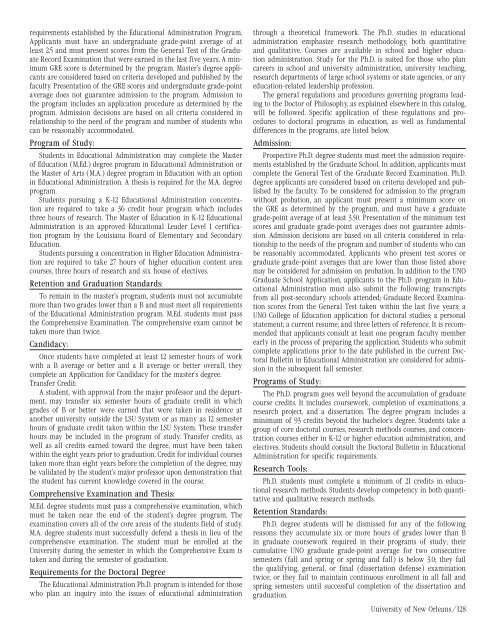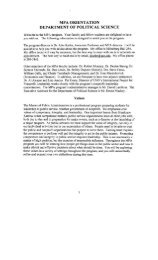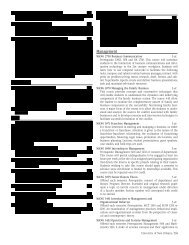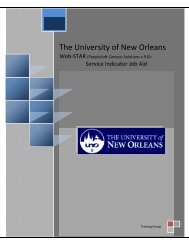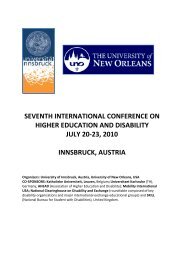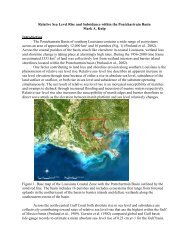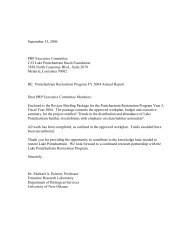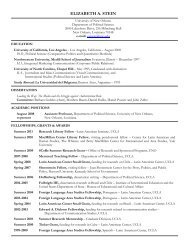Untitled - University of New Orleans
Untitled - University of New Orleans
Untitled - University of New Orleans
You also want an ePaper? Increase the reach of your titles
YUMPU automatically turns print PDFs into web optimized ePapers that Google loves.
equirements established by the Educational Administration Program.<br />
Applicants must have an undergraduate grade-point average <strong>of</strong> at<br />
least 2.5 and must present scores from the General Test <strong>of</strong> the Graduate<br />
Record Examination that were earned in the last five years. A minimum<br />
GRE score is determined by the program. Master’s degree applicants<br />
are considered based on criteria developed and published by the<br />
faculty. Presentation <strong>of</strong> the GRE scores and undergraduate grade-point<br />
average does not guarantee admission to the program. Admission to<br />
the program includes an application procedure as determined by the<br />
program. Admission decisions are based on all criteria considered in<br />
relationship to the need <strong>of</strong> the program and number <strong>of</strong> students who<br />
can be reasonably accommodated.<br />
Program <strong>of</strong> Study:<br />
Students in Educational Administration may complete the Master<br />
<strong>of</strong> Education (M.Ed.) degree program in Educational Administration or<br />
the Master <strong>of</strong> Arts (M.A.) degree program in Education with an option<br />
in Educational Administration. A thesis is required for the M.A. degree<br />
program.<br />
Students pursuing a K-12 Educational Administration concentration<br />
are required to take a 36 credit hour program which includes<br />
three hours <strong>of</strong> research. The Master <strong>of</strong> Education in K-12 Educational<br />
Administration is an approved Educational Leader Level 1 certification<br />
program by the Louisiana Board <strong>of</strong> Elementary and Secondary<br />
Education.<br />
Students pursuing a concentration in Higher Education Administration<br />
are required to take 27 hours <strong>of</strong> higher education content area<br />
courses, three hours <strong>of</strong> research and six house <strong>of</strong> electives.<br />
Retention and Graduation Standards:<br />
To remain in the master’s program, students must not accumulate<br />
more than two grades lower than a B and must meet all requirements<br />
<strong>of</strong> the Educational Administration program. M.Ed. students must pass<br />
the Comprehensive Examination. The comprehensive exam cannot be<br />
taken more than twice.<br />
Candidacy:<br />
Once students have completed at least 12 semester hours <strong>of</strong> work<br />
with a B average or better and a B average or better overall, they<br />
complete an Application for Candidacy for the master’s degree.<br />
Transfer Credit:<br />
A student, with approval from the major pr<strong>of</strong>essor and the department,<br />
may transfer six semester hours <strong>of</strong> graduate credit in which<br />
grades <strong>of</strong> B or better were earned that were taken in residence at<br />
another university outside the LSU System or as many as 12 semester<br />
hours <strong>of</strong> graduate credit taken within the LSU System. These transfer<br />
hours may be included in the program <strong>of</strong> study. Transfer credits, as<br />
well as all credits earned toward the degree, must have been taken<br />
within the eight years prior to graduation. Credit for individual courses<br />
taken more than eight years before the completion <strong>of</strong> the degree, may<br />
be validated by the student’s major pr<strong>of</strong>essor upon demonstration that<br />
the student has current knowledge covered in the course.<br />
Comprehensive Examination and Thesis:<br />
M.Ed. degree students must pass a comprehensive examination, which<br />
must be taken near the end <strong>of</strong> the student’s degree program. The<br />
examination covers all <strong>of</strong> the core areas <strong>of</strong> the students field <strong>of</strong> study.<br />
M.A. degree students must successfully defend a thesis in lieu <strong>of</strong> the<br />
comprehensive examination. The student must be enrolled at the<br />
<strong>University</strong> during the semester in which the Comprehensive Exam is<br />
taken and during the semester <strong>of</strong> graduation.<br />
Requirements for the Doctoral Degree<br />
The Educational Administration Ph.D. program is intended for those<br />
who plan an inquiry into the issues <strong>of</strong> educational administration<br />
through a theoretical framework. The Ph.D. studies in educational<br />
administration emphasize research methodology, both quantitative<br />
and qualitative. Courses are available in school and higher education<br />
administration. Study for the Ph.D. is suited for those who plan<br />
careers in school and university administration, university teaching,<br />
research departments <strong>of</strong> large school systems or state agencies, or any<br />
education-related leadership pr<strong>of</strong>ession.<br />
The general regulations and procedures governing programs leading<br />
to the Doctor <strong>of</strong> Philosophy, as explained elsewhere in this catalog,<br />
will be followed. Specific application <strong>of</strong> these regulations and procedures<br />
to doctoral programs in education, as well as fundamental<br />
differences in the programs, are listed below.<br />
Admission:<br />
Prospective Ph.D. degree students must meet the admission requirements<br />
established by the Graduate School. In addition, applicants must<br />
complete the General Test <strong>of</strong> the Graduate Record Examination. Ph.D.<br />
degree applicants are considered based on criteria developed and published<br />
by the faculty. To be considered for admission to the program<br />
without probation, an applicant must present a minimum score on<br />
the GRE as determined by the program, and must have a graduate<br />
grade-point average <strong>of</strong> at least 3.50. Presentation <strong>of</strong> the minimum test<br />
scores and graduate grade-point averages does not guarantee admission.<br />
Admission decisions are based on all criteria considered in relationship<br />
to the needs <strong>of</strong> the program and number <strong>of</strong> students who can<br />
be reasonably accommodated. Applicants who present test scores or<br />
graduate grade-point averages that are lower than those listed above<br />
may be considered for admission on probation. In addition to the UNO<br />
Graduate School Application, applicants to the Ph.D. program in Educational<br />
Administration must also submit the following: transcripts<br />
from all post-secondary schools attended; Graduate Record Examination<br />
scores from the General Test taken within the last five years; a<br />
UNO College <strong>of</strong> Education application for doctoral studies; a personal<br />
statement; a current resume; and three letters <strong>of</strong> reference. It is recommended<br />
that applicants consult at least one program faculty member<br />
early in the process <strong>of</strong> preparing the application. Students who submit<br />
complete applications prior to the date published in the current Doctoral<br />
Bulletin in Educational Administration are considered for admission<br />
in the subsequent fall semester.<br />
Programs <strong>of</strong> Study:<br />
The Ph.D. program goes well beyond the accumulation <strong>of</strong> graduate<br />
course credits. It includes coursework, completion <strong>of</strong> examinations, a<br />
research project, and a dissertation. The degree program includes a<br />
minimum <strong>of</strong> 93 credits beyond the bachelor’s degree. Students take a<br />
group <strong>of</strong> core doctoral courses, research methods courses, and concentration<br />
courses either in K-12 or higher education administration, and<br />
electives. Students should consult the Doctoral Bulletin in Educational<br />
Administration for specific requirements.<br />
Research Tools:<br />
Ph.D. students must complete a minimum <strong>of</strong> 21 credits in educational<br />
research methods. Students develop competency in both quantitative<br />
and qualitative research methods.<br />
Retention Standards:<br />
Ph.D. degree students will be dismissed for any <strong>of</strong> the following<br />
reasons: they accumulate six or more hours <strong>of</strong> grades lower than B<br />
in graduate coursework required in their programs <strong>of</strong> study; their<br />
cumulative UNO graduate grade-point average for two consecutive<br />
semesters (fall and spring or spring and fall) is below 3.0; they fail<br />
the qualifying, general, or final (dissertation defense) examination<br />
twice; or they fail to maintain continuous enrollment in all fall and<br />
spring semesters until successful completion <strong>of</strong> the dissertation and<br />
graduation.<br />
<strong>University</strong> <strong>of</strong> <strong>New</strong> <strong>Orleans</strong>/128


